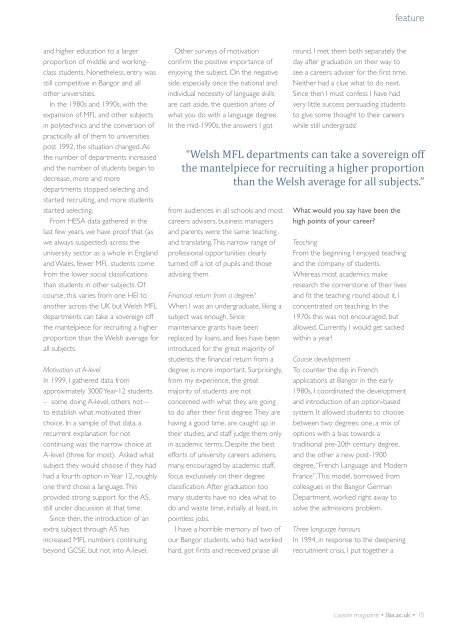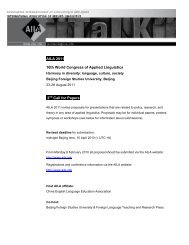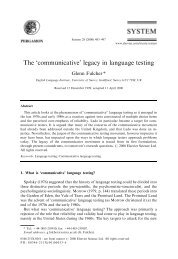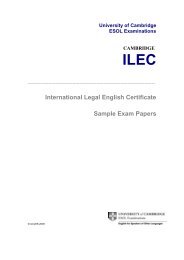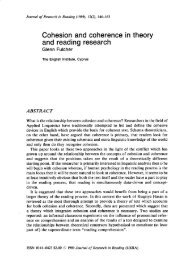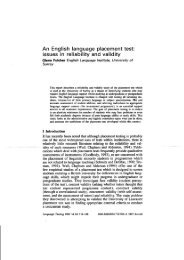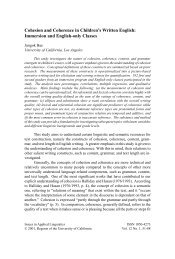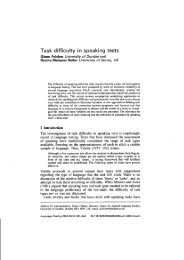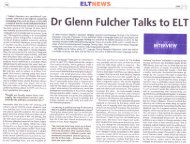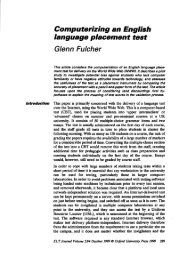Liaison Magazine - LLAS Centre for Languages, Linguistics and ...
Liaison Magazine - LLAS Centre for Languages, Linguistics and ...
Liaison Magazine - LLAS Centre for Languages, Linguistics and ...
Create successful ePaper yourself
Turn your PDF publications into a flip-book with our unique Google optimized e-Paper software.
feature<br />
<strong>and</strong> higher education to a larger<br />
proportion of middle <strong>and</strong> workingclass<br />
students. Nonetheless, entry was<br />
still competitive in Bangor <strong>and</strong> all<br />
other universities.<br />
In the 1980s <strong>and</strong> 1990s, with the<br />
expansion of MFL <strong>and</strong> other subjects<br />
in polytechnics <strong>and</strong> the conversion of<br />
practically all of them to universities<br />
post 1992, the situation changed. As<br />
the number of departments increased<br />
<strong>and</strong> the number of students began to<br />
decrease, more <strong>and</strong> more<br />
departments stopped selecting <strong>and</strong><br />
started recruiting, <strong>and</strong> more students<br />
started selecting.<br />
From HESA data gathered in the<br />
last few years, we have proof that (as<br />
we always suspected) across the<br />
university sector as a whole in Engl<strong>and</strong><br />
<strong>and</strong> Wales, fewer MFL students come<br />
from the lower social classifications<br />
than students in other subjects. Of<br />
course, this varies from one HEI to<br />
another across the UK but Welsh MFL<br />
departments can take a sovereign off<br />
the mantelpiece <strong>for</strong> recruiting a higher<br />
proportion than the Welsh average <strong>for</strong><br />
all subjects.<br />
Motivation at A-level<br />
In 1999, I gathered data from<br />
approximately 3000 Year-12 students<br />
– some doing A-level, others not –<br />
to establish what motivated their<br />
choice. In a sample of that data, a<br />
recurrent explanation <strong>for</strong> not<br />
continuing was the narrow choice at<br />
A-level (three <strong>for</strong> most). Asked what<br />
subject they would choose if they had<br />
had a fourth option in Year 12, roughly<br />
one third chose a language.This<br />
provided strong support <strong>for</strong> the AS,<br />
still under discussion at that time.<br />
Since then, the introduction of an<br />
extra subject through AS has<br />
increased MFL numbers continuing<br />
beyond GCSE, but not into A-level.<br />
Other surveys of motivation<br />
confirm the positive importance of<br />
enjoying the subject. On the negative<br />
side, especially once the national <strong>and</strong><br />
individual necessity of language skills<br />
are cast aside, the question arises of<br />
what you do with a language degree.<br />
In the mid-1990s, the answers I got<br />
from audiences in all schools <strong>and</strong> most<br />
careers advisers, business managers<br />
<strong>and</strong> parents were the same: teaching<br />
<strong>and</strong> translating.This narrow range of<br />
professional opportunities clearly<br />
turned off a lot of pupils <strong>and</strong> those<br />
advising them.<br />
Financial return from a degree<br />
When I was an undergraduate, liking a<br />
subject was enough. Since<br />
maintenance grants have been<br />
replaced by loans, <strong>and</strong> fees have been<br />
introduced <strong>for</strong> the great majority of<br />
students, the financial return from a<br />
degree is more important. Surprisingly,<br />
from my experience, the great<br />
majority of students are not<br />
concerned with what they are going<br />
to do after their first degree.They are<br />
having a good time, are caught up in<br />
their studies, <strong>and</strong> staff judge them only<br />
in academic terms. Despite the best<br />
ef<strong>for</strong>ts of university careers advisers,<br />
many, encouraged by academic staff,<br />
focus exclusively on their degree<br />
classification. After graduation too<br />
many students have no idea what to<br />
do <strong>and</strong> waste time, initially at least, in<br />
pointless jobs.<br />
I have a horrible memory of two of<br />
our Bangor students, who had worked<br />
hard, got firsts <strong>and</strong> received praise all<br />
round. I met them both separately the<br />
day after graduation on their way to<br />
see a careers adviser <strong>for</strong> the first time.<br />
Neither had a clue what to do next.<br />
Since then I must confess I have had<br />
very little success persuading students<br />
to give some thought to their careers<br />
while still undergrads!<br />
“Welsh MFL departments can take a sovereign off<br />
the mantelpiece <strong>for</strong> recruiting a higher proportion<br />
than the Welsh average <strong>for</strong> all subjects.”<br />
What would you say have been the<br />
high points of your career<br />
Teaching<br />
From the beginning I enjoyed teaching<br />
<strong>and</strong> the company of students.<br />
Whereas most academics make<br />
research the cornerstone of their lives<br />
<strong>and</strong> fit the teaching round about it, I<br />
concentrated on teaching. In the<br />
1970s this was not encouraged, but<br />
allowed. Currently, I would get sacked<br />
within a year!<br />
Course development<br />
To counter the dip in French<br />
applications at Bangor in the early<br />
1980s, I coordinated the development<br />
<strong>and</strong> introduction of an option-based<br />
system. It allowed students to choose<br />
between two degrees: one, a mix of<br />
options with a bias towards a<br />
traditional pre-20th century degree,<br />
<strong>and</strong> the other a new post-1900<br />
degree,“French Language <strong>and</strong> Modern<br />
France”.This model, borrowed from<br />
colleagues in the Bangor German<br />
Department, worked right away to<br />
solve the admissions problem.<br />
Three language honours<br />
In 1994, in response to the deepening<br />
recruitment crisis, I put together a<br />
<strong>Liaison</strong> magazine • llas.ac.uk •15


